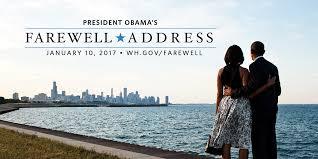By Ralph Benko
I am a nationally recognized archconservative. (Just not a bogeyman as we are routinely presented in the media.) I tuned in to President Obama's Farewell Address with considerable curiosity. I am not an Obama-hater. I've not been shy to publicly criticize him when I disagreed with him or to call it when he committed fouls. On the other hand, I give him enormous credit for having brought home the vast majority of our troops, extracting America from its foreign entanglements in other people's Forever Wars. Credit where credit is due.
I considered -- and reported to my LivingRoomConversations.org colleagues -- Obama's Farewell Address to be "a classy, dignified, terrific speech (even the bits I disagreed with)." In addition to his valedictory on what he was proud of having gotten done what really resonated with me was his "Call To Action," for all Americans to talk -- and listen -- to one another. President Obama:
For too many of us, it's become safer to retreat into our own bubbles, whether in our neighborhoods or college campuses or places of worship or our social media feeds, surrounded by people who look like us and share the same political outlook and never challenge our assumptions. The rise of naked partisanship, increasing economic and regional stratification, the splintering of our media into a channel for every taste - all this makes this great sorting seem natural, even inevitable. And increasingly, we become so secure in our bubbles that we accept only information, whether true or not, that fits our opinions, instead of basing our opinions on the evidence that's out there.
...
In his own farewell address, George Washington wrote that self-government is the underpinning of our safety, prosperity, and liberty, but "from different causes and from different quarters much pains will be taken...to weaken in your minds the conviction of this truth;" that we should preserve it with "jealous anxiety;" that we should reject "the first dawning of every attempt to alienate any portion of our country from the rest or to enfeeble the sacred ties" that make us one.
We weaken those ties when we allow our political dialogue to become so corrosive that people of good character are turned off from public service; so coarse with rancor that Americans with whom we disagree are not just misguided, but somehow malevolent. We weaken those ties when we define some of us as more American than others; when we write off the whole system as inevitably corrupt, and blame the leaders we elect without examining our own role in electing them.
It falls to each of us to be those anxious, jealous guardians of our democracy; to embrace the joyous task we've been given to continually try to improve this great nation of ours. Because for all our outward differences, we all share the same proud title: Citizen.
Ultimately, that's what our democracy demands. It needs you. Not just when there's an election, not just when your own narrow interest is at stake, but over the full span of a lifetime. If you're tired of arguing with strangers on the internet, try to talk with one in real life.
As it happens, Joan Blades and I also drew from Washington's Farewell Address in an earlier blog To Prevent the Spirit of Partisanship From Bursting into a Flame.
We wrote:
Washington's farewell address -- recently brought to our attention in a Huffington Post Blog by David Benko, the son of one of this post's authors -- warned against the very partisan paralysis that besets America today. Washington considered hyper-partisanship profoundly dangerous:
"Let me now ... warn you in the most solemn manner against the baneful effects of the spirit of party generally.
"This spirit, unfortunately, is inseparable from our nature, having its root in the strongest passions of the human mind. It exists under different shapes in all governments, more or less stifled, controlled, or repressed; but, in those of the popular form, it is seen in its greatest rankness, and is truly their worst enemy.
...
"And there being constant danger of excess, the effort ought to be by force of public opinion, to mitigate and assuage it. A fire not to be quenched, it demands a uniform vigilance to prevent its bursting into a flame, lest, instead of warming, it should consume."
My colleagues like Joan and I agree with Presidents Obama and Washington on this crucial matter. We've been making it easy -- pleasurable in fact! -- to allow good souls of both the left and the right "to talk with (a stranger) in real life," thereby vigilantly using "the force of public opinion" to keep the danger of excess partisanship from "bursting into flame."
Obama is right: "we all share the same proud title: Citizen." It may boggle the imagination that the small, intimate, conversations we have with those from a different political persuasion can have a profound effect on our political outcomes. But it's true.
Don't take my word for it. Among the testimonials to the simple, profound, fact of the power of citizens talking amongst ourselves, including with those with whom we disagree, are the Farewell Addresses of President Barack Obama and President George Washington.

